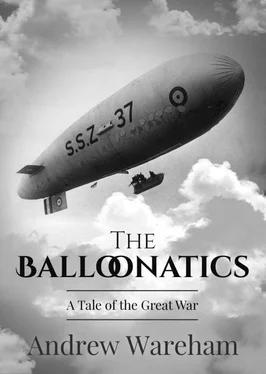“A rail warrant to Shoreham, which is, I understand, a temporary base, and I shall call for a rating to carry your suitcase to the Docks station. You can be at your new posting in two or three hours, if the Southern Railway will permit – it’s only a few miles along the coast, Brighton way.”
Shoreham by the Sea, a small and sedate holiday resort, not as stuffy as Worthing and far less vulgar than Brighton. It was the haunt of the widows of the middle class, bank managers and upwards, had tearooms and very few pubs. There were healthy walks along the seafront and inland on the hills of the Weald. As a location for a naval base, it had little to recommend it.
To be practical, however, London was barely an hour away by express train, so the bright lights of Shoreham were not so vital to the young man’s existence. Brighton itself had a music hall and any number of hotels and pubs and restaurants and was renowned for its night life and for the proliferation of high-class, expensive ladies of the town during the high season. Plenty for a young officer to do there on his days off.
Peter walked across to the Docks station, discovered he must change trains at Fratton, three or four miles away on the outskirts of Portsmouth, close to the football ground, to pick up a slow train on the coast line to Brighton, getting off just a few miles short of the larger resort.
It was a nuisance because he would have to carry his own bags, not the normal habit for an officer. A lieutenant was not entitled to his own sailor servant and must convey himself around the country when the occasion arose.
Not a disaster, however.
He hopped aboard the first train out, off again at Fratton almost before he had time to sit down, then the wait for the slow and infrequent services of the line along the coast. There would be no restaurant car on the little trains. He bought a cup of tea at the station buffet, waiting for the train from Southampton to Brighton to pull in. It would be a slow and tedious run, time to think about the service he had so casually dived into.
He must write a letter home – completely open about the cause of his transfer, admitting that he had made the move as the only way of saving his career. The big men in the City heard everything. His father would certainly be in a position to talk to somebody in the know in the Admiralty and would soon hear both Captain Holder’s words and Savage’s. The letter must be frank in stating that Calliope ran down the admiral’s barge while he had the watch, the ship shifting its berth to the Gun Wharf to ammunition before going out to active service. He could also make it apparently clear that the captain had seized upon the incident to remove an officer who was socially his superior, far better bred and possessed of the bearing of a gentleman.
The captain had tried to break him and would have succeeded had it not been for Holder; now Peter would do his best to break the captain. He thought he had a fair chance of succeeding. The Navy loved rumours and scandal and would make the most of this one.
Balloons! He did not recall ever seeing one in flight. Pictures in newspapers, certainly; scare stories about Zeppelins, frequently. But Captain Holder had specified blimps, not the great dirigibles made famous in Germany. Smaller and without the rigid keel of the big ships and with a tiny crew. His own command, however.
Long, slow patrols – only eight or ten, perhaps twelve hours at a time. Nothing in terms of naval patrols which could last for many months. He could expect to sleep in his own bed every night, almost a nine-to-five existence.
He wondered about the wardroom. Probably a preponderance of lieutenants, and subs, perhaps midshipmen permitted entry. Few of senior officers; they would not be needed. It could be a freer existence than a ship could offer. It might be a good idea to send a message home, requesting his trunk with his dress and formal uniforms. He might find himself obliged to wear them again. There would mess evenings and dinners, almost of a certainty.
There was a stir on the platform as the train finally arrived, coming from Southampton, a small engine pulling just four passenger coaches. The front half of the first carriage was first class, almost all of the compartments taken. He seated himself in one of the empty, facing the engine as he preferred, and made ready for ninety minutes of tedium. It was no great distance but the train stopped at every station along the coast between Portsmouth and Brighton.
The carriage door opened and a porter ushered a young lady inside at Chichester. Presumably there were no empty compartments and the porter felt that a naval officer was safe company for an unaccompanied female.
They sat in silence for ten minutes before the young lady, a girl in fact, ventured to speak.
“Beg your pardon for disturbing you, sir. Does this train stop at Shoreham?”
“It does, miss. I am getting off there myself. Have you baggage in the guard’s van?”
“My trunk and suitcase. I watched the porter place it aboard before entering the carriage. Miss Shovell said I should.”
Peter enquired who the lady might be, was informed, as he had suspected, that she was a schoolmistress. The young lady was a schoolgirl, it seemed. She was not wearing a uniform.
“I have been called home from school to live with my grandparents in Shoreham, sir. They are quite old and my father has been sent away to America, to the embassy as Second Secretary. He will stay there for three years, I expect. That is how long we stayed in St Petersburg. He did not think I should cross the ocean to join him, because of the submarines. My Mama died many years ago, there are just the two of us.”
“I see.”
“I had wanted to leave school last year, for not liking it very much. Papa had no more than an apartment in London for a few months and could hardly accommodate me there. He had expected to go to Washington last year. The War meant he had to remain in London for some while longer, and he had rented out our house, so he had to take a temporary place, which was a nuisance.”
Peter agreed that it must be.
“I am posted to the RNAS field at Shoreham, to fly balloons. Blimps in fact.”
She was sure he must be excited at the prospect. She would much like to rise high in the sky under a balloon.
Peter supposed he might as well – he had not yet considered the flying aspect.
“I expect I shall see you flying over the town, sir.”
“Perhaps. We will patrol out to sea, against the submarines. I do not know Shoreham or where the airfield is located.”
Neither did she. Perhaps they might see each other in town on occasion – it was only a small place, she believed.
“We may well. I am Lieutenant Peter Naseby, by the way.”
“Miss Josephine Hawes-Parker, sir.”
An attractive youngster, he thought, barely out, though her hair was up and her skirts down to her ankles, so she was of marriageable age. Not a lot out of the ordinary – she had a figure and bright blue eyes that flashed intelligence. A pleasant little girl – it would be no hardship to talk to her if they met in the town of an afternoon, which might well happen, the place being so small.
As a lieutenant, Peter was effectively forbidden to marry. He could do so, if he was very unwise, and Their Lordships would instantly post him to the China Station, unaccompanied, for three years. Lieutenant Commanders could marry, and some did, but it was generally the case that matrimony must wait until attainment of the rank of Commander. Naval wages were such that only an officer with a private income could wed before the rank of Rear Admiral, at least.
Dalliance with respectable young females was therefore unwise for a lieutenant – nothing could come of it, for a seduction would result in a rapid court martial for conduct unbecoming upon its disclosure. The Navy upheld certain standards, sneering at the Army, which did not. Army officers were commonly known in Society as womanisers; Naval officers normally were not, perhaps with the exception of Beatty, who adhered to few of the norms.
Читать дальше












